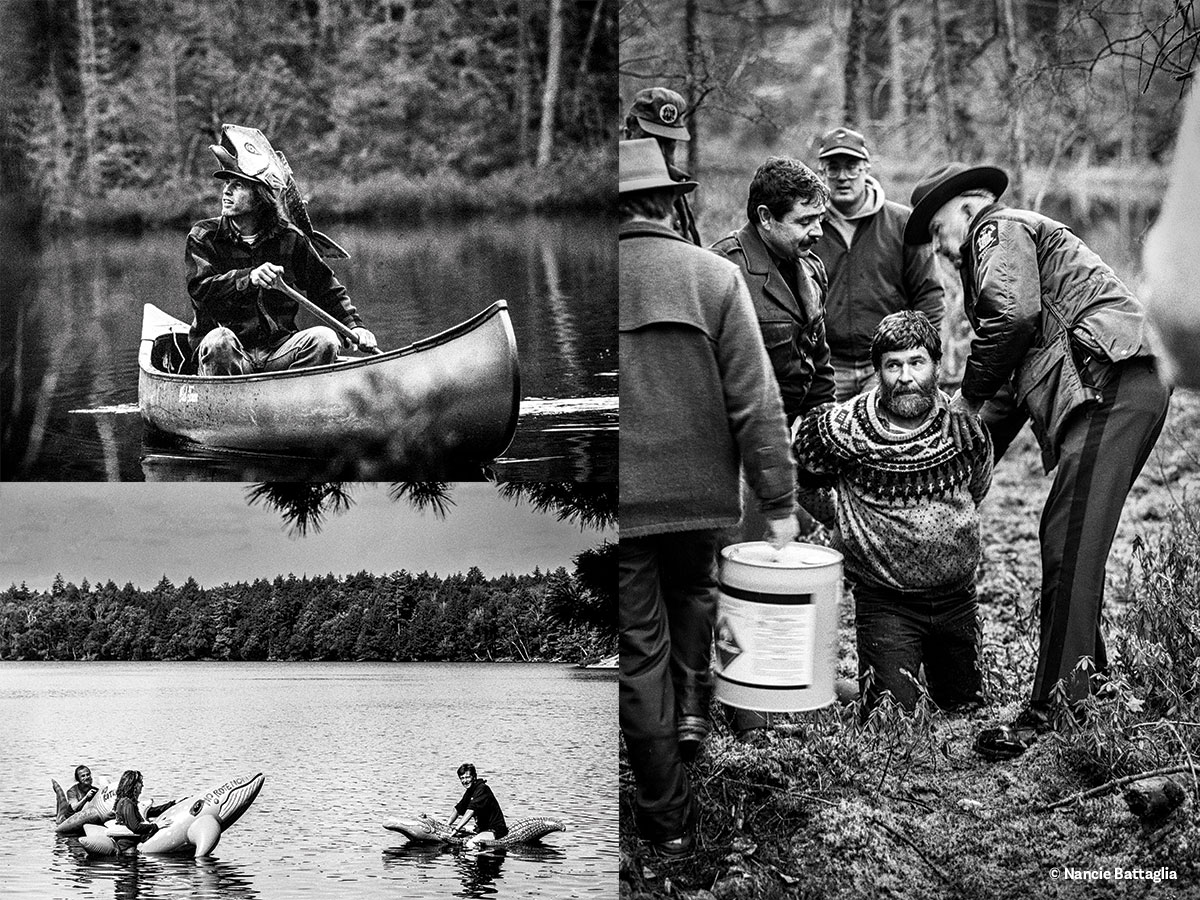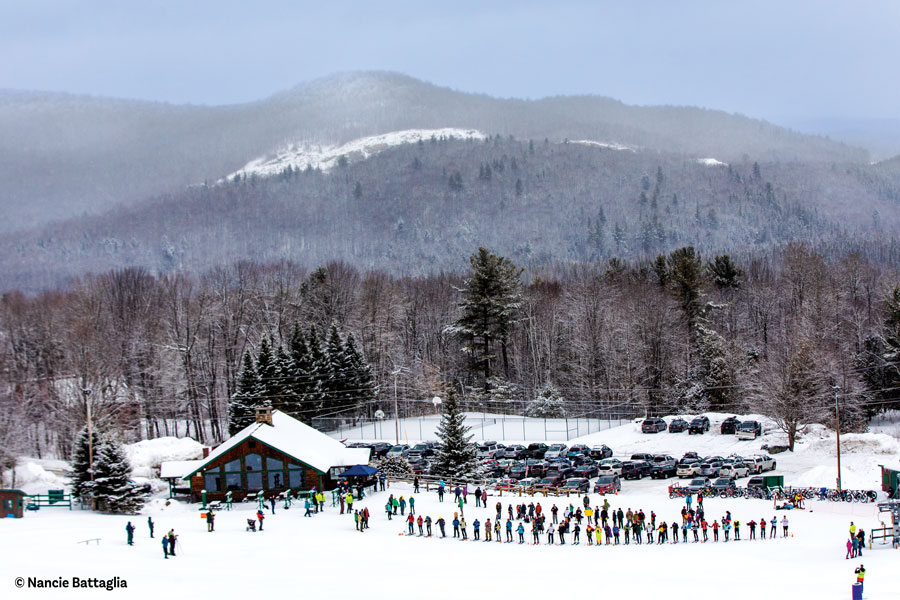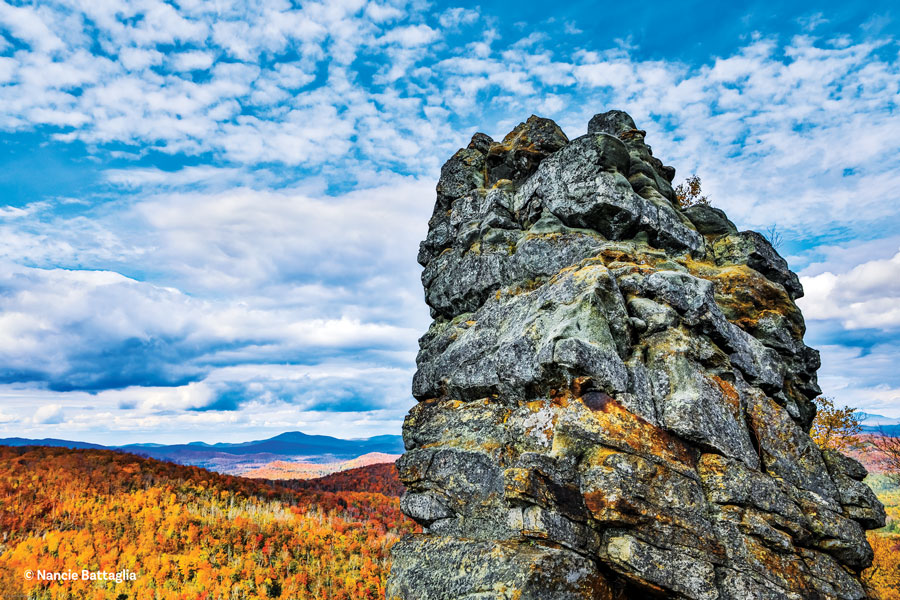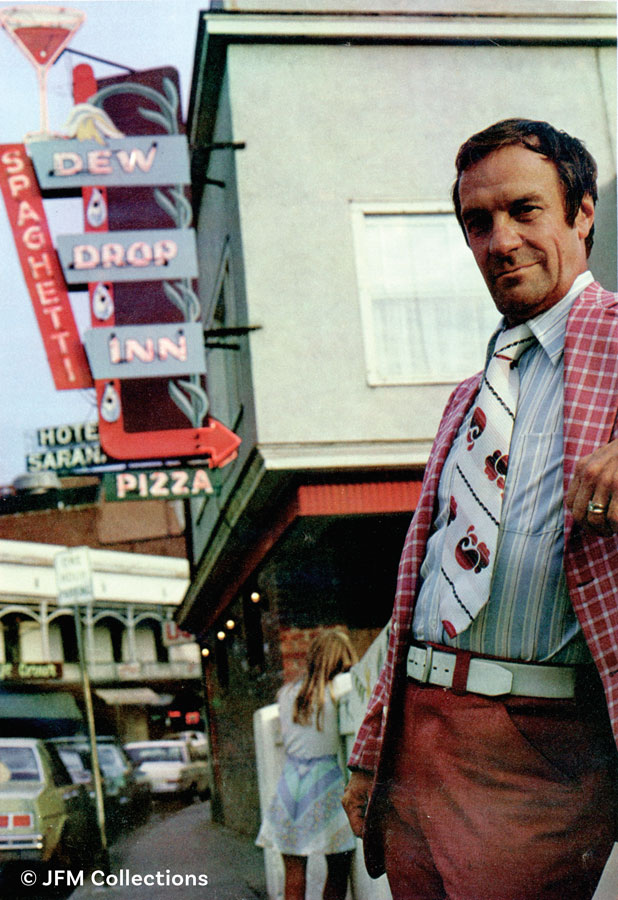Roger Jakubowski: I decided that I can’t work for nobody. They’re liable to find out how dumb I really am. Never educated or nothin’. What can I do? A guy’ll tell me to take out the trash, I won’t even do that right. I have to be the boss.
James Kunstler: Why do you think you’re so dumb if you’ve done so well?
RJ: Because I should have a hundred times more. I should own the entire Adirondack Park, that’s what I think. I don’t own it. The whole park, including upstate, the 1000 Islands. Yeah, that’s what I think.
The story of Roger Jakubowski’s preternatural arrival in the North Country two years ago has already entered the annals of Adirondack legend, but for those of you who have been out of state or in a coma since 1985, or don’t get the New York papers, here’s the recap in a nutshell:
New Jersey hot dog millionaire Jakubowski comes to the Adirondacks to inspect an old spring water bottling operation that’s for sale and is so charmed by these mountains that he at once starts buying up everything in sight. His foremost purchase is Camp Topridge, the old Marjorie Merriweather Post estate outside Paul Smiths. The shopping list also includes Crab Island in Lake Champlain, the Big Tupper Ski Center, most of pristine Lake Ozonia, radio stations in Plattsburgh and Tupper Lake, and more. A flamboyant fellow, his appetite for publicity is bottomless. He courts the press and his droll utterances make great copy.
I’d gone on the state tour of Topridge back in ’84—long before Roger Jakubowski took the property and everything it contained off Governor Cuomo’s hands—so I knew which stuff was Marjorie’s and which was his. What few people understand about Camp Topridge and its creator Ms. Post is that her taste in home furnishings ran along the lines of Elvis Presley’s. Then, of course, Roger moved in some stuff of his own.
There were, for instance, the skunk pelt table mats (hers), and the four-foot-tall brass candlesticks (his), which looked like a gift to the College of Cardinals from the President-for-Life of a third world republic. There was the polyester leopard-skin sofa (hers)—as though nobody would notice it among the dozens of real fur couches, settees, chaises, divans, chairs, and ottomans—and the chess set (his) with pawns the size of pepper mills and kings on the order of Wade Boggs’ baseball bat. There was the clunky, cheap-looking, sludge-colored dinner service (hers), including demitasse cups, and the unusual tapestry made of stitched-together shearling sheepskin patches depicting Simon Bolivar astride a charger (his) tacked to the lofty ceiling. And of course there were all the motheaten stuffed animals, the beaver, porcupine, fox, marten, flying squirrels, elk, bison, caribou, moose, pronghorn, bighorn, cape buffalo, gnu, eland, ibex, zebra—a veritable Mutual of Omaha Wild Kingdom of dead critters (not to mention whole schools of stuffed fish)—all Marjorie’s. And there was Roger’s 100-watt-per-channel Mclntosh stereo with the six gigantic Klipsch horn speakers, disguised in “rustic” cabinets as big as port-a-johns, blasting out the late and great Marvin Gaye singing “Heard It Through The Grapevine” at a volume loud enough to raise all the aforementioned slain beasts from their sleep of death and send them thundering for the doors. I’d arrived early one morning in mid-spring to find the main gate open and unattended—a situation, I learned later, which had made Jakubowski furious on numerous occasions, according to former employees. But much as he harangued the staff about the gate, the damn thing had a way of staying open, so that any boob, including a nosy reporter, could gain entry to the estate.
The Topridge compound of 60-odd buildings bristles atop a narrow spine of rock and conifer that forms a kind of wall between Upper Saint Regis Lake and Upper and Lower Spectacle Ponds. Begun in the 1930s by the daughter of cereal tycoon C.W. Post, the hodgepodge of little guest cottages and assorted party shacks, along with the main lodge, is a maintenance crew’s nightmare. In fact, the staggering cost of upkeep, amounting to several hundred thousand dollars a year, was the chief reason behind the State’s eagerness to unload the place (possibly illegally, since Marjorie had willed it to the people of New York). In any case, Roger Jakubowski was already up before nine on the morning of my visit, a little bleary perhaps, his long silver hair tousled as though from sleep, trying to instruct his somewhat overwhelmed three-man maintenance crew on their chores for the day. He had one of them in person and issued orders to the others over a crackling walkie-talkie.
Finally, satisfied that his minions would proceed faithfully as ordered, Roger ushered me gruffly up the ridge, past the drabber buildings formerly occupied by Mrs. Post’s army of guides, gardeners and housekeepers, to the gargantuan main lodge. Then, he vanished.
In his place there soon appeared a man of impressive girth, late 40s perhaps, who somehow managed to look dignified despite his outfit—a kind of blue-denim smock suit. The man introduced himself as Roger Jakubowski’s “art advisor,” Victor Bacon. In fact, Victor served Roger in a wide variety of roles, usually as cook, but he was also family—well, in a way—having once been married to Roger Jakubowski’s sister. Roger referred to Victor as the “proctor” of Topridge. (Oddly, two weeks before my visit Victor Bacon had left Topridge entirely, according to a former employee who chanced to meet Victor at the airport. That day Victor had been full of gall and resentment at the Lord of Topridge, and it was astounding, the former employee said, to hear that Victor was back again. Later, Victor attributed his leave to health reasons. “I needed a little vacation, actually,” he said.)
Victor offered to show me Roger’s art collection while his boss washed up before breakfast. In the center of Marjorie’s 30-foot long dining room table—between the giant brass candlesticks—stood an imposing silvered bronze statue of a sword-wielding viking by a sculptor named La Port. One had to admire the droll effect of placing such a pugnacious figure amid the salad plates and soup bowls, his broadsword ready should some dinner guest utter an incorrect remark.
At the head of the main stairway, built out of colossal tree trunks, stood a Japanese bronze urn the size of a stockpot full fold rose petals that had lost their scent. “Late Meiji period,” Victor said—meaning the early 1900s, around the time of the Taft administration. Across the vast main room, before a fireplace as big as a walk-in closet, lay another bronze sculpture about four feet around of two bulls fighting. At one-tenth the size it would have made a nice paperweight, or perhaps a doorstop. I asked Victor what his prior experience had been in this line of work. “I used to be in the gift and art-ware business,” he replied. Art-ware?, I wondered. Anyway, he too made to disappear now, saying he had to prepare Roger’s breakfast, and I was left alone again with the music of The Big Chill blaring from the Klipsches.
Just then I happened to notice what seemed to be a rummage sale going on in one of the sun porches off the main lodge. There was someone—a young woman—searching through a lot of clothes on one of those portable metal racks. Plus, there was an array of miscellaneous bric-a-brac spread out on tables all around the sun porch. You could tell it was Marjorie’s old stuff. For example, there were two outsized ceramic candlabra the same sludge color as her tableware. I ventured in.
Now, the idea of a rummage sale here was fairly preposterous—not just because we were more than a mile away from any public road—and indeed that’s not what proved to be going on. In fact, it was an advertising company doing a shoot for one of its clients: the K-Mart clothing division. The clothes on the racks, then, were K-Mart fashions. The photo crew was down below somewhere, near the old boathouse. I barely had a minute to chat up the wardrobe girl before Victor Bacon summoned me to the breakfast table.
Roger Jakubowski is hardly the first rich outsider to try and carve a personal empire out of these mountains. Adirondack lore is filled with case histories of megalomania. Consider Robert Schroeder, the 19th century beer baron who built Debar Park in the Town of Duane, Franklin County. The estate included what was reputed to be the world’s largest hops farm—the flowering herb used to give beer its characteristic flavor. The centerpiece was a 60-room mansion with adjoining thoroughbred stables and a private racetrack. By and by, however, Schroeder’s business went bust, he lost everything, and committed suicide in a Brooklyn rooming house.
Or take Litchfield Park, a failed attempt to create a European-style shooting preserve filled with walking hunting trophies. Around the turn of the century, Edward H. Litchfield fenced in 9,100 acres in the Town of Altamont and tried to stock it with elk and moose—long extirpated by the white man—and also wild boar. For years he and his son kept at it but the animals all dropped dead sooner or later and in 1905 the experiment was abandoned. It wasn’t until 75 years later that scientists discovered a brain-rotting parasite carried by slugs and spread by white-tailed deer (who are immune to it) which devastated the moose and elk, and thus doomed the Litchfield Park scheme from the start.
Roger Jakubowski’s plans are, well, perhaps less elegant than these strange examples. But in two years he has unquestionably become the most conspicuous citizen in these parts. Meanwhile, much of the North Country establishment—that is, the powers-that-be, the old money sports, the WASPy-snobby club folk, the Adirondack Council members, the civic leaders—are scared to death of this Jersey parvenu who makes no bones about wanting to buy up the entire gosh-darn Adirondacks like some kind of devouring forest demon out of Algonquian mythology.
“The things he says are more worrisome than the things he’s done,” said Dick Beamish, spokesman for the Adirondack Council, the Park’s chief watchdog organization. “His statements that the only future for the Adirondack Park is development, and that real estate is scandalously underpriced, trouble us. The fact is that despite the Agency’s zoning plan, the law has weaknesses and there is room for a lot of potential development. Someone like Roger Jakubowski can be a threat to permanently preserving the natural character of the Park—but so far he’s only made a lot of boasts.”
Breakfast was served to Roger on another sun porch opposite the one where the K-Mart thing was happening. It was a simple repast, a buttered English muffin to be exact. Roger—who often refers to himself as Roger, in the third person form of address—was a little slow to warm up for our interview. But having a keen sense of his own outrageousness, he soon reached full stride. His discourse is often punctuated by the phrase “you know what I mean?,” but spoken rapidly so as to come out more like, “you know whimean.” Anyway, here are some highlights from the dialogue that ensued:
JK: Did Roger Jakubowski have any dreams of the North Woods when he was a kid?
RJ: Didn’t even know what the North Woods is. It took me two months to say the word Adirondacks.
JK: Do you have a grand plan for developing the Adirondacks?
RJ: Yes, I do. As different things are collected, it’s my plan as a businessman to enhance, which enhances me personally and enhances the area. I think the first initial step—which has only been better for my business—is awareness of the Adirondacks for people such as myself who never heard of it. Don’t forget, this is not the Canadian wilderness or Rhodesia. An hour and a half, you’re in New York City. I can understand why people kept this place such a secret. It’s a wonderful place. Take a look at the people on the lake. You can’t even get to their home by boat. If they want people to visit, they don’t put in a road, they put in a helipad.
JK: You must be aware that a lot of people are nervous about you and all your money.
RJ:They’re nervous anyway. I can’t really think of anybody in the Adirondacks, anybody, who would be against progress in a controlled way, which is how I want it. There are guidelines, laws. I’ve lived up to every law. I’m not changing anything. If anything, I haven’t done anything.
JK: What actual opportunities are there here for business, other than Big Tupper (the ski center).
RJ: Plenty of opportunities. The place is crawlin’ with ’em.
JK: Like what?
RJ: The manufacturin’ industry. Some people up here, they seem to want to work, you know whimean?
JK: Doesn’t the Adirondack Park Agency have pretty stringent restrictions on that?
RJ: For people wanting to work?
JK: No. For manufacturing, industrial uses.
RJ: This is my home. When you come home your wife will tell you please, don’t manufacture in the living room, go manufacture in the garage. That’s the same thing. So, we got a bigger house in the Adirondack Park.
JK: Is there anything in particular you’re thinking of manufacturing here? Any particular sort of products?
RJ: Yeah, probably water-related. It could be shampoo, you know whimean? Look at all the ingredients of everything in the supermarket. Everything: the major addition is water.
At this point, Roger was having trouble opening one of the miniature jam jars that Victor had brought to the table. Roger had injured his hand tinkering with a motorboat engine the day before. Sensing his boss’s distress, Victor quickly seized the jar, opened it, and spooned the jam out onto Roger’s plate. There was something touching about his helplessness and Victor’s eagerness to please. Then our interview continued.
JK: You spent the first 40-odd years of your life not knowing about this area, and now you’re enchanted by it.
RJ: Enchanted, in love, mesmerized, and I believe I have no reason to go anywhere else in the world. Do you know what a place like this would cost in Lake Tahoe? I was offered 4.5 million for this place 90 days after I bought it (for $911,000).
JK: Do you stay in Marjorie Merriweather Post’s cottage?
RJ: There are living quarters throughout the camp. But I do not stay in her home. I would like to keep it as a memento to the prior owner who no doubt will go down in history as one of the finest most intelligent women there ever was. The reason I know that is you see what she created throughout the country. It has to be that way. Who else done something like what she have done, singlehandedly. Without benefits—she had benefits of husbands, but they were only temporarily. She withstood them all.
We talked at great length about the history of Roger’s business exploits in New Jersey, what has become a standard resume in the newspaper stories about him—his lowly beginnings selling meat off a truck in Camden, his retirement to California to promote arm wrestling tournaments, his return to the east at age 31 and his subsequent conquest of the hot dog business at the Jersey seashore. This all led, naturally, to his 1986 arrival in the Adirondacks, to the subject of his real estate buying binge since then, and his oft-made boast that he would like to buy the entire Adirondack Park, if it was possible.
JK: What would you do with it all?
RJ: Who cares? What would I do? First, get it! You know, I’m not an “if man.”
JK: I’m kind of curious where your burning desire comes from to have all this.
RJ: It’s not a burning desire. It’s a regret and the sympathy I give myself for not having it.
JK: Does it cause you any pain that other people have it and you don’t?
RJ: Positively.
JK: Like Joe Blow across the lake has a camp, do you want to have his camp?
RJ: I’d like to have it all.
JK: So the question of what to do with it isn’t important at all?
RJ: First get it. We’ll worry about that next. One day at a time. See, if I owned it all, there’d be no beaver dams because I’d take care of the beavers. We have a crew who goes out and takes care of the beavers. We don’t have to worry about going out and killing them because we’re gonna take him and we’re gonna have a beaver.
JK: Do you want the Adirondack Park to be your private amusement park?
RJ: No, I don’t want the Adirondack Park. No, I want Roger’s Park to be for my own amusement.
JK: When is the next load of your friends coming up here to Topridge?
RJ: Next week. People who help me make money, that’s a friend.
JK: Marjorie had people coming here all the time.
RJ: Making her billions. When she had the army here, all the generals were here. I guarantee you if you went to an outpost in Outer Mongolia where the United States Army was, they were drinkin’ nothing but Maxwell House coffee and eatin’ nothin’ but Jello, and havin’ nothing but Post for breakfast. You know what it is to have five billion customers all at once? That’s how she done it.
JK: So, this isn’t enough here?
RJ: Never enough! Never enough!
JK: You have this general philosophy that just about everthing is undervalued.
RJ: That’s correct.
JK: Why do you suppose that is?
RJ: It’s like the state buying land, you know, for $75, $100 an acre. Anybody’s got them kind of prices, call me. Call up the State and see what they’re paying.
JK: Do you consider yourself lucky?
RJ: Story of my life. Everything I touch turns to gold. Automatic. Wherever it is. Jeez. Go turn on the radio station I just bought in Tupper Lake. You couldn’t hear it outside the city limits. Go turn it on now. You can’t get it off the station. What, did the airwaves change? What happened that all of a sudden you can hear the radio that’s been around for a hundred years?
JK: I dunno. What?
RJ: Roger owns it.
JK: Did you put up a bigger transmitter or something?
RJ: Yeah, we got a couple—yeah.
JK: Well, that helps, doesn’t it?
RJ: Yeah, but you’re not supposed to know that.
JK: Aside from the stuff around here (Camp Topridge), how are you keeping busy?
RJ: Jeez, a number of things. We got Big Tupper which was a pretty big business. We kept this place going all winter. I like to see the 20 foot icicles coming off the side.
JK: Did you feel like you were in a fantasyland?
RJ: I just felt so special. Like I was in Christmasland, Santa Clausland, Rogerland.
Our interview concluded, Roger sent me off on a tour of other buildings with Victor Bacon. Among our stops, the hallowed personal cottage of Marjorie Merriweather Post, all the original decor in place, the enormous boudoir still painted the nightmarish livid pinks I remembered so well from my first tour, years before Roger came along. Shortly, Victor too excused himself in order to prepare lunch for the K-mart advertising crew. He, in turn, snagged a young maintenance man, who we shall call “Bob” in order to protect his job, and told him to show me around the putting greens and tennis courts.
To get there we had had to cross a little slough down by the lake where, evidently, beavers had done a considerable amount of feasting in recent months. The characteristic pointed stumps of their cuisine could be seen all around. I mentioned this to Bob.
“Oh yeah,” he agreed avidly. “But we got rid of them last week.”
“Got rid of them?” I said. “What? Moved them somewhere else?”
“Naw,” he said. “We offed them.”
How to Succeed in Business According to Roger Jakubowski
“The food business just requires some common sense. So, I went to the hot-dog stand, I told the guy, ‘Listen, you gotta pay me more rent.’ He says, ‘You’re nuts, it’s impossible.’ I said, ‘Whaddaya mean it’s impossible?’ I says, ‘I need more rent to pay this crazy price I paid for this thing.’ He says, ‘You’re nuts.’ I say, ‘Okay, I’m nuts.’ You know whimean? ‘Now I want it. Know whimean? Cause I’m so nuts.’ He says, ‘You’re crazy.’ I says, ‘Just raise it up a nickel on the sodas, you’ll be able to give me.’ He says, ‘Impossible, you’re nuts, but I’ll pay it.’ You follow me? So, what do you think the guy does? Raises it a dime! Know whimean? A nickel for me, a nickel for himself. Which is okay. It taught me a lesson. Lyin’, no good, rotten, thievin’—know whimean?—and he’s hollering and screamin’ at me, like I’m some kind of nut. I just told him what to do. He didn’t take my suggestion to raise it a nickel. He raised it a dime, show me how dumb I am. You know whimean? So, he made plenty more, and I got to at least be able to live. But I had to live with that low price for the next few years. So, after that when the lease came up, and I looked at him—you know whimean?—’Now, you gotta go. Now I gotta raise it three dollars.’ See whimean? Know whimean? Yeah, because I thought he was that smart. Plus, his time is up. He’s in business here for 50 years. It’s time to let somebody else try. So, I tried. That’s all. No other reason. I said, ‘It’s time. You been in business 50 years, go die somewhere else. Don’t die on my property.’ So, he hadda go.”
























